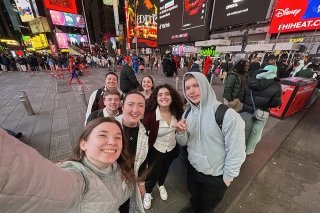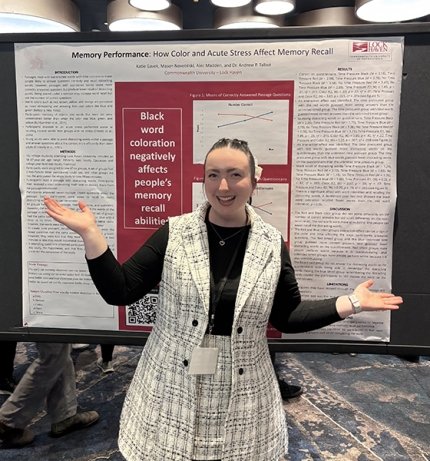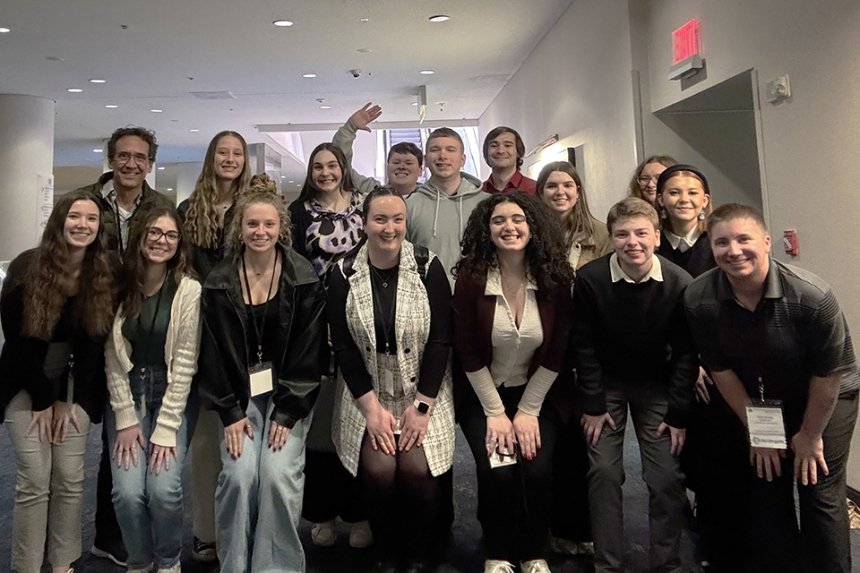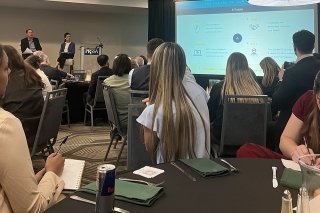Psychology majors shine at Eastern Psychological Association conference
University-wide
Posted

For Virginia Gavek, presenting her research at the 96th annual Eastern Psychological Association (EPA) Annual Meeting was more than just an academic milestone — it was a valuable and incredible experience that intensified her passion for psychology and research.
“It was my first time showcasing my research in a professional setting,” said Gavek, a junior psychology major at Commonwealth University-Lock Haven. “It really gave me the confidence to see myself as a researcher, not just a student.”
Gavek was among a group of Commonwealth University psychology students from Bloomsburg, Lock Haven, and Mansfield campuses attending and presenting research at the EPA conference in New York City. Each spring, EPA members present the latest advances in professional and scientific work in psychology. The conference allows researchers from all areas of psychology to present their work in the form of talks, posters, and symposia.
Gavek said preparing for a conference of this scale demanded significant effort, from developing research and analyzing data to creating an engaging presentation. She said Lock Haven’s psychology program offered the essential support and direction. Faculty helped mentor students throughout the research journey, ensuring they were equipped for the experience.

“They helped refine my research focus, gave me feedback on my presentation skills and encouraged me every step of the way,” Gavek said. “Without them, I don’t think I would’ve had the confidence to present.”
Gavek’s research, “Memory Performance: How Color and Acute Stress Affect Memory Recall,” focused on how people who read passages with warm-toned words with time constraints are likely to answer questions correctly and recall distracting words; while passages with cool-toned words lead to more correctly answered questions but produce lower recall of distracting words.
“Being placed under a time stressor may increase word recall but not the number of correct questions,” Gavek said. “Findings from 114 participants and a series of parametric tests suggest word coloration and distractions have an influence on recall ability.”
For Gavek, the conference was a personal achievement and a proud moment for the psychology program. Attending and presenting at a well-respected conference showcased the program’s commitment to academic excellence and research opportunities for students.
“Being able to represent Lock Haven at this level was a huge honor,” she said. “It shows that our (program) is creating strong, capable researchers who can stand alongside students from bigger institutions.”
Gavek believes that more students should take advantage of similar opportunities, emphasizing that Lock Haven provides the support needed to succeed.
“If you’re considering presenting at a conference, don’t hesitate,” she encouraged. “The experience is worth it, and Lock Haven does everything possible to make sure students are prepared and supported.”
With the EPA Conference now over, Gavek is excited about what lies ahead. The experience has reaffirmed her passion for research, and she hopes to continue exploring psychology at a deeper level, whether through graduate studies or professional research opportunities.
“This experience has motivated me to push myself even further,” she said. “I know now that I have the skills and support to succeed, and I’m excited to see where my research journey takes me next.”
Opportunities like the EPA Conference are stepping stones to bigger academic and professional accomplishments for Gavek and many other psychology majors. The program’s dedication to fostering student research and providing hands-on experiences brightens the future for aspiring psychologists.




